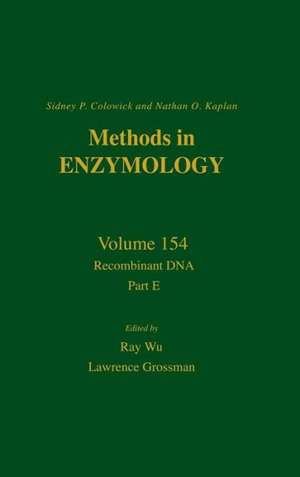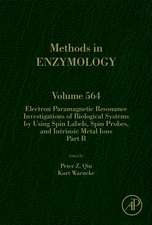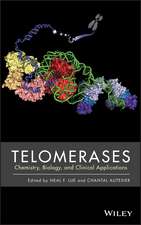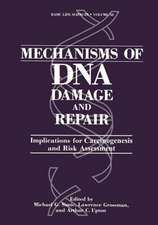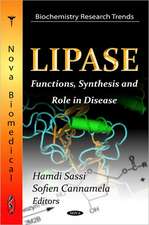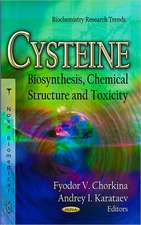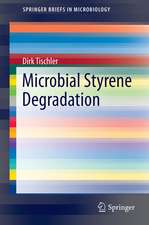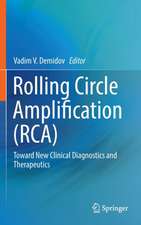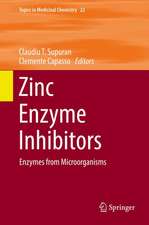Recombinant DNA, Part E: Methods in Enzymology, cartea 154
John N. Abelson, Melvin I. Simon Ray Wu, Lawrence Grossmanen Limba Engleză Hardback – 10 dec 1987
Din seria Methods in Enzymology
-
 Preț: 390.54 lei
Preț: 390.54 lei -
 Preț: 391.30 lei
Preț: 391.30 lei -
 Preț: 392.01 lei
Preț: 392.01 lei -
 Preț: 391.01 lei
Preț: 391.01 lei - 28%
 Preț: 801.23 lei
Preț: 801.23 lei - 32%
 Preț: 802.54 lei
Preț: 802.54 lei - 23%
 Preț: 461.36 lei
Preț: 461.36 lei - 23%
 Preț: 460.60 lei
Preț: 460.60 lei - 23%
 Preț: 439.86 lei
Preț: 439.86 lei - 23%
 Preț: 448.15 lei
Preț: 448.15 lei - 23%
 Preț: 451.42 lei
Preț: 451.42 lei - 23%
 Preț: 445.18 lei
Preț: 445.18 lei - 5%
 Preț: 557.15 lei
Preț: 557.15 lei - 23%
 Preț: 450.67 lei
Preț: 450.67 lei - 23%
 Preț: 446.23 lei
Preț: 446.23 lei - 23%
 Preț: 435.87 lei
Preț: 435.87 lei - 23%
 Preț: 445.94 lei
Preț: 445.94 lei - 23%
 Preț: 459.55 lei
Preț: 459.55 lei - 23%
 Preț: 460.02 lei
Preț: 460.02 lei - 23%
 Preț: 450.54 lei
Preț: 450.54 lei - 23%
 Preț: 453.47 lei
Preț: 453.47 lei - 5%
 Preț: 565.37 lei
Preț: 565.37 lei - 23%
 Preț: 450.67 lei
Preț: 450.67 lei - 23%
 Preț: 464.33 lei
Preț: 464.33 lei - 23%
 Preț: 441.49 lei
Preț: 441.49 lei - 23%
 Preț: 447.44 lei
Preț: 447.44 lei - 23%
 Preț: 459.13 lei
Preț: 459.13 lei - 23%
 Preț: 445.80 lei
Preț: 445.80 lei - 23%
 Preț: 445.35 lei
Preț: 445.35 lei - 23%
 Preț: 442.53 lei
Preț: 442.53 lei - 23%
 Preț: 450.38 lei
Preț: 450.38 lei - 23%
 Preț: 448.60 lei
Preț: 448.60 lei - 23%
 Preț: 447.57 lei
Preț: 447.57 lei - 23%
 Preț: 440.90 lei
Preț: 440.90 lei - 23%
 Preț: 448.15 lei
Preț: 448.15 lei - 23%
 Preț: 466.84 lei
Preț: 466.84 lei - 23%
 Preț: 451.42 lei
Preț: 451.42 lei - 23%
 Preț: 453.64 lei
Preț: 453.64 lei - 23%
 Preț: 459.13 lei
Preț: 459.13 lei - 23%
 Preț: 457.49 lei
Preț: 457.49 lei - 23%
 Preț: 447.44 lei
Preț: 447.44 lei - 5%
 Preț: 561.34 lei
Preț: 561.34 lei - 23%
 Preț: 447.57 lei
Preț: 447.57 lei - 23%
 Preț: 453.35 lei
Preț: 453.35 lei - 23%
 Preț: 441.95 lei
Preț: 441.95 lei - 23%
 Preț: 450.38 lei
Preț: 450.38 lei - 23%
 Preț: 449.19 lei
Preț: 449.19 lei - 23%
 Preț: 456.02 lei
Preț: 456.02 lei
Preț: 450.38 lei
Preț vechi: 584.90 lei
-23% Nou
Puncte Express: 676
Preț estimativ în valută:
86.18€ • 92.16$ • 71.86£
86.18€ • 92.16$ • 71.86£
Carte tipărită la comandă
Livrare economică 17 aprilie-01 mai
Preluare comenzi: 021 569.72.76
Specificații
ISBN-13: 9780121820558
ISBN-10: 0121820556
Pagini: 576
Dimensiuni: 152 x 229 x 33 mm
Greutate: 0.98 kg
Editura: ELSEVIER SCIENCE
Seria Methods in Enzymology
ISBN-10: 0121820556
Pagini: 576
Dimensiuni: 152 x 229 x 33 mm
Greutate: 0.98 kg
Editura: ELSEVIER SCIENCE
Seria Methods in Enzymology
Public țintă
Biochemists, geneticists, microbiologists, genetic engineers, analytical chemists, clinical chemists, molecular biologists, industrial researchers working on protein products, and plant scientists involved in plant breeding and plant pathology.Cuprins
Methods for Cloning cDNA. H. Okayama, M. Kawaichi, M. Brownstein, F. Lee, T. Yokota, and K. Arai, High-Efficiency Cloning of Full-Length cDNA; Construction and Screening of cDNA Expression Libraries for Mammalian Cells. G. Heidecker and J. Messing, A Method for Cloning Full-Length cDNA in Plasmid Vectors. D.C. Alexander, An Efficient Vector*b1Primer cDNA Cloning System. C. Coleclough, Use of Primer*b1Restriction End Adapters in cDNA Cloning. Identification of Cloned Genes and Mapping of Genes. A.A. Reyes and R.B. Wallace, Mapping of RNA Using S1 Nuclease and Synthetic Oligonucleotides. C.G. Miyada and R.B. Wallace, Oligonucleotide Hybridization Techniques. M. Snyder, D. Sweetser, R.A. Young, and R.W. Davis, *glgt 11: Gene Isolation with Antibody Probes and Other Applications. M.R. Gray, G.P. Mazzara, P. Reddy, M. Rosbash, Searching for Clones with Open Reading Frames. G.M. Weinstock, Use of Open Reading Frame Expression Vectors. J.D. Boeke, J. Trueheart, G. Natsoulis, and G.R. Fink, 5-Flouroorotic Acid as a Selective Agent in Yeast Molecular Genetics. F.J. de Bruijn, Transposon Tn5 Mutagenesis to Map Genes. J.D. Noti, M.N. Jagadish, and A.A. Szalay, Site-Directed Tn5 and Transplacement Mutagenesis: Methods to Identify Symbiotic Nitrogen Fixation Genes in Slow-Growing Rhizobium. Chemical Synthesis and Analysis of Oligodeoxynucleotides. R. Frank, A. Meyerhans, K. Schwellnus, and H. Blvcker, Simultaneous Synthesis and Biological Applications of DNA Fragments: An Efficient and Complete Methodology. H.W. DjurhuusYMatthes, A. Staub, and P. Chambon, The Segmented Paper Method: DNA Synthesis and Mutagenesis by Rapid Microscale "Shotgun Gene Synthesis". M.H. Caruthers, A.D. Barone, S.L. Beaucage, D.R. Dodds, E.F. Fisher, L.J. McBride, M. Matteucci, Z. Stabinsky, and J.-Y. Tang, Chemical Synthesis of Deoxyoligonucleotides by the Phosphoramidite Method. S.J. Horvath, J.R. Firca, T. Hunkapiller, M.W. Hunkapiller, and L. Hood, An Automated DNA Synthesizer Employing Deoxynucleoside 3*b7-Phosphoramidites. Site-Specific Mutagenesis and Protein Engineering. M.J. Zoller, Oliconucleotide-Directed Mutagenesis: A Simple Method Using Two Oligonucleotide Primers and a Single-Stranded DNA Template. W. Kramer and H.-J. Fritz, Oligonucleotide-Directed Construction of Mutations via Gapped Duplex DNA. T.A. Kunkel, J.D. Roberts, and R.A. Zakour, Rapid and Efficient Site-Specific Mutagenesis without Phenotypic Selection. P. Carter, Improved Oligonucleotide-Directed Mutagenesis Using M13 Vectors. D.F. Mark, A. Wang, and C. Levenson, Site-Specific Mutagenesis to Modify the Human Tumor Necrosis Factor Gene. R. Pine and P.C. Huang, An Improved Method to Obtain a Large Number of Mutants in a Defined Region of DNA. P. Kollman and W.F. van Gunsteren, Molecular Mechanics and Dynamics in Protein Design. S. Pongor, The Use of Structural Profiles and Parametric Sequence Comparison in the Rational Design of Polypeptides. J.W. Taylor and E.T. Kaiser, Structure*b1Function Analysis of Proteins through the Design, Synthesis, and Study of Peptide Models. C.R. Matthews, Effect of Point Mutations on the Folding of Globular Proteins. T. Alber and B.W. Matthews, Structure and Thermal Stability of Phage T4 Lysozyme. Author Index. Subject Index.
Recenzii
Praise for the Volume
"This reviewer finds Methods in Enzymology Volume 154, Recombinant DNA Part E to be excellent reference book for persons working in molecular biology." --ADOLESCENT AND PEDIATRIC GYNECOLOGY
from:Praise for the Series
"The Methods in Enzymology series represents the gold-standard." --NEUROSCIENCE
"Incomparably useful." --ANALYTICAL BIOCHEMISTRY
"It is a true 'methods' series, including almost every detail from basic theory to sources of equipment and reagents, with timely documentation provided on each page." --BIO/TECHNOLOGY
"The series has been following the growing, changing and creation of new areas of science. It should be on the shelves of all libraries in the world as a whole collection." --CHEMISTRY IN INDUSTRY
"The appearance of another volume in that excellent series, Methods in Enzymology, is always a cause for appreciation for those who wish to successfully carry out a particular technique or prepare an enzyme or metabolic intermediate without the tiresome prospect of searching through unfamiliar literature and perhaps selecting an unproven method which is not easily reproduced." --AMERICAN SOCIETY OF MICROBIOLOGY NEWS
"If we had some way to find the work most often consulted in the laboratory, it could well be the multi-volume series Methods in Enzymology...a great work." –-ENZYMOLOGIA
"A series that has established itself as a definitive reference for biochemists." --JOURNAL OF CHROMATOGRAPHY
"This reviewer finds Methods in Enzymology Volume 154, Recombinant DNA Part E to be excellent reference book for persons working in molecular biology." --ADOLESCENT AND PEDIATRIC GYNECOLOGY
from:Praise for the Series
"The Methods in Enzymology series represents the gold-standard." --NEUROSCIENCE
"Incomparably useful." --ANALYTICAL BIOCHEMISTRY
"It is a true 'methods' series, including almost every detail from basic theory to sources of equipment and reagents, with timely documentation provided on each page." --BIO/TECHNOLOGY
"The series has been following the growing, changing and creation of new areas of science. It should be on the shelves of all libraries in the world as a whole collection." --CHEMISTRY IN INDUSTRY
"The appearance of another volume in that excellent series, Methods in Enzymology, is always a cause for appreciation for those who wish to successfully carry out a particular technique or prepare an enzyme or metabolic intermediate without the tiresome prospect of searching through unfamiliar literature and perhaps selecting an unproven method which is not easily reproduced." --AMERICAN SOCIETY OF MICROBIOLOGY NEWS
"If we had some way to find the work most often consulted in the laboratory, it could well be the multi-volume series Methods in Enzymology...a great work." –-ENZYMOLOGIA
"A series that has established itself as a definitive reference for biochemists." --JOURNAL OF CHROMATOGRAPHY
